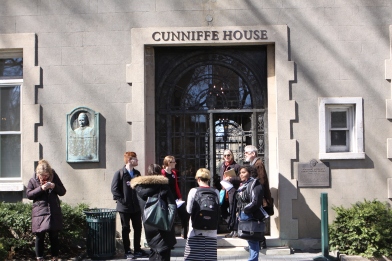
Students and faculty gathered outside Cunniffe House in preparation to deliver petition. (Victor Ordonez/The Fordham Ram)
By Victor Ordonez
Students and members of Fordham Faculty United (FFU) gathered outside Dealy Hall on Mar. 9 in preparation to hand deliver a student petition to Fordham University president Rev. Joseph M. McShane, S.J. The petition called for students, faculty and administration alike to help in “efforts to form a union and win a voice for all non-tenure track faculty at our school.”
The student petition was fashioned by members of Fordham Students United (FSU) and Service Employees International Union (SEIU).
FFU was made aware that they would not be able to meet with McShane prior to their gathering. Alan Trevithick, fellow adjunct and member of FFU, corresponded with McShane via email on Mar. 6. Trevithick formally asked to meet and discuss ongoing plans to form a union for non-tenure track faculty.
McShane declined to intervene in current adjunct deliberations due to possible legal implications, according to Trevithick. In response McShane’s neutrality, FFU issued the following statement:
We are disappointed that we will not be able to meet with father McShane about our union movement on campus. The reason McShane said that he is unable to meet with us is because he does not want to interfere with our deliberations. By that account, we believe that means that our administration will remain neutral. They have remained neutral thus far and we believe they will follow in the path of schools like Georgetown and Saint Louis University as we move toward winning a voice for our contingent faculty
Regardless of McShane’s declination to meet, a coalition of FFU members and students proceeded to deliver a student petition to McShane’s office Thursday Mar. 9. However, Trevithick clarified in an email to The Ram that members of FFU were pleased with the phrasing of McShane’s email and that the gathering was a means of keeping the president informed on the organization’s plan of action.
“The fact that he does not want to ‘intervene’ in our deliberations could be a very good sign,” said Trevithick. “We are organizing very well and we are the threshold of filing with the National Labor Relations Board. This stance of neutrality is in a sense all we are really looking for.”
Trevithick said that McShane’s neutrality was similar to tactics used by the administration at Georgetown University, a case in which adjuncts eventually won their right to unionize.
Kathryn Krasinski, a Fordham anthropology professor and member of FFU, helped to deliver the student petition alongside fellow adjuncts. She described her growing concerns for her living conditions due to her insufficient Fordham salary.
“I am working a lot of other jobs to earn ends meet because I am not making enough money here to that,” said Krasinski. “In the fall semester, I received my last paycheck around thanksgiving and I didn’t receive my first [spring semester] check until February.”
As of 2016, for a standard undergraduate course meeting for three hours per week, Fordham University is said to have a minimum pay of $3,900. Depending on the professor’s experience and credentials, that number can reach $5,000 per course.
Krasinski said that time is also a factor not recognized in her Fordham salary, which she said inevitably equates to volunteer work.
“Part of the reason that I want work at a university is to have that one-on-one interaction with students, but we are not compensated for any of that time,” said Krasinski. “I use these checks to pay for rent, food, electricity and other bills. In the end, I am concerned about having a place to live and having enough food while I’m working at Fordham”
Hannah Jopling, adjunct anthropology professor said that as a result of unionization, FFU would deal with the “principle issues, such as salary improvement, longer term contracts and healthcare benefits.”
A faculty petition is also currently in circulation, according to Jopling.
The university did not respond for comment in time for publication of this article.
